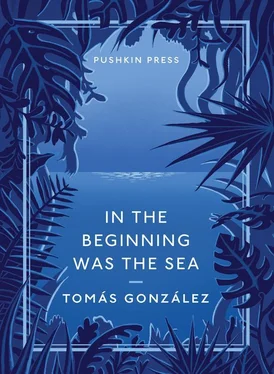That afternoon, the three of them sat down at the dining table to drink. Guillermo had a particularly colourful way of speaking; he told them he had just taken up a job with a company named Bananos de Colombia who had posted him to a village full of starving people that smelt like an open sewer. The company had provided him with accommodation. “The fucking house has four bedrooms, two bathrooms, a kitchen, and hot and cold running mosquitoes.” The village was on the road between Turbo and Medellín and J. realized he would have somewhere to stay if he wanted to make the trip in two stages.
At six o’clock, already slightly drunk, all three went off to see the stud bull mount a cow that one of the neighbours had brought. Guillermo, clearly aroused by this startling display of copulation, stared surreptitiously at Elena’s cleavage on the way back. They carried on drinking until dawn.
A few hours later they were woken by Gilberto, who told them Salomón was on his deathbed. J. felt a sudden wrenching terror in his stomach and ran to the outhouse to vomit.
Salomón had got up at dawn to work in the forest. Though he had been carrying a machete when he felt the snake bite into his calf, in his panic he did not even think to draw the blade. With the snake still hanging from his leg like a whip, the man stumbled out of the woods, tripped and accidentally buried the machete in his stomach. He was delirious by the time he was found; his face was blue and already he smelt of rotting flesh.
When J. and Guillermo arrived at Salomón’s cabin, they found him dead. There were four candles on the ground, one at each corner of the long table on which the corpse — grotesquely swollen and purplish — was laid out. J. did not want to get too close to the body, but Guillermo, whose fascination with death was equalled only by his obsession with food, watched as Don Eduardo embalmed the corpse.
Having embraced Doña Rosa, J. headed back to the finca . Since they were all in shock, they sat on the veranda and drank. That night, J. dreamt Salomón had come into his room and was walking towards the bed. In the middle of the night, he woke up screaming in terror just as the dead man was about to speak. Elena calmed him, rocking him like a baby until he fell asleep again, his head resting on her breasts.
Two days later, after he had witnessed the lurid burial rites, Guillermo left, taking a bag of ripe mangoes and several kilos of guagua meat bought from the village. “If I don’t leave soon, those two will turn me into an alcoholic,” he thought as he watched the coastline recede.
J. was sorry to see him go.
JUST AS he had feared, the timber shipment that J. accompanied to Turbo in mid-February was declared poor quality. The sum paid by the lumber merchants scarcely covered his expenses and he was strongly advised to keep a close eye on the quality of the loggers’ work. Returning to the finca , J. was sullen and unforthcoming. His loan was due in less than two months and he knew that Fernando would not renew it again — in fact, he would ostentatiously refuse. His foul mood led him to ill-treat the loggers, sometimes without reason, and to become distant from them. This was a mistake because, since Maximiliano’s departure, they had once again begun to work well.
He also became infuriated by the cattle; it was as though God — or God knows who — had determined that his herd should never increase in number. Every time a calf was born, a bullock was stolen, a cow was struck by lightning or a heifer disappeared. At first, J. attempted to deal with the problem with his usual calm; later, news that one of the cattle had died could cast a pall over his whole day, and he would become paranoid, imagining some dark conspiracy was at work. At such times, he needed a few drinks to avoid the sudden squalls of fury that frequently led him to spew abuse at Elena, Gilberto, or indeed anyone who crossed his path.
Some months earlier, J. had come back from Medellín with a German shepherd, a pureblood pedigree pup that proved fretful and frustrating. The dog chewed its way through various things including a number of J.’s books, Gilberto’s little transistor radio and several pairs of Elena’s sandals, and so, barely a month after buying it, he decided to give the pup to Salomón, who had a way with animals. When Salomón died, J. reclaimed the dog, now a full-grown bitch with a glossy black coat, but as fretful as ever. It was a curious case of animal madness: the dog yapped constantly, compulsively, she attacked visitors and, whenever J. or Elena came back from somewhere, she would descend on them like a tornado, pawing, burying her snout in their crotches, getting mud on their clothes. The dog was so temperamental they sometimes carried a stick to fend her off. Once, when Don Eduardo came to visit, the dog tried to bite him and J. decided he would have to chain her up, something that simply made her madder still. She barked day and night, got caught up in the chain and howled, often in the dead of night, until someone went down to the beach to disentangle her, and every time she managed to break free, she wrecked the house.
One night, unable to sleep, J. was sitting up worrying about the finca . Outside, the dog barked furiously, choking on her collar as though there was an intruder. Obviously, no one was prowling around the house; the dog could just as easily be barking at a firefly, at a bat, at the moon. Suddenly J. felt a black liquid flooding his brain. In a blind rage, he leapt out of bed and grabbed his rifle. Senseless with rage, he rushed down to the beach where the dog was tethered to a post and, without a second’s thought, fired both barrels into the animal’s head. The gunshots echoed through the forest as the dog fell dead in a heap. Without a word, J. fetched a spade, went to the paddock and began to dig. A few minutes later Gilberto arrived with a shovel and silently set to helping. Elena watched from the veranda for a while, then went back to bed.
Such outbursts, while violent, did not occur often. The finca and its crew were like a ship becalmed with no fixed destination. This did not particularly matter to J. since he had never expected to grow rich here — that, he realized, was impossible — nor did he even expect reason to thrive in this sweltering, tropical climate. In fact, he had come here in order to escape a demeaning form of rationality that was as sterile as crude oil, as social climbing as bitumen. This was why he loathed Elena’s fence; it was a caricature of a caricature, a pitiful example of what human endeavour could achieve. This was why he became so exasperated when the timber was badly cut, because it needlessly compounded one madness — the felling of a tree — and plunged him into an absurd vortex of senselessness and death. When one of the cattle died, he was not troubled by the money it represented, and only slightly by the fact that the finca as a business would not prosper, but simply because he had once dreamt of owning fields filled with healthy livestock, an innocent dream, ultimately, of wanting things to be fruitful and multiply.
Only the seedbeds had fulfilled his expectations. Providence had ushered in a clement summer, and Gilberto had carefully tended to them, ensuring they never lacked water in the dry season. In the late afternoons, usually alone, J. would visit the fields to watch them grow, to see the palm saplings unfurling their fans and the lush green wreathing the branches of the orange trees. With winter now scarcely a month away, their survival seemed assured. And indeed it was; later, when they had been transplanted — not by J. but by another soul — the palm trees grew sturdy and tall, and the orange trees blossomed and bore fruit. Some years later, coconut palms in the area would be devastated by a disease called porroca at which point other people would sow new seeds, watch the saplings grow, wait for them to be ready to be transplanted. Once more the palms would grow straight and true, once more they would bear fruit: coconut palms like these, standing by the sea, swayed by the salt breeze.
Читать дальше










